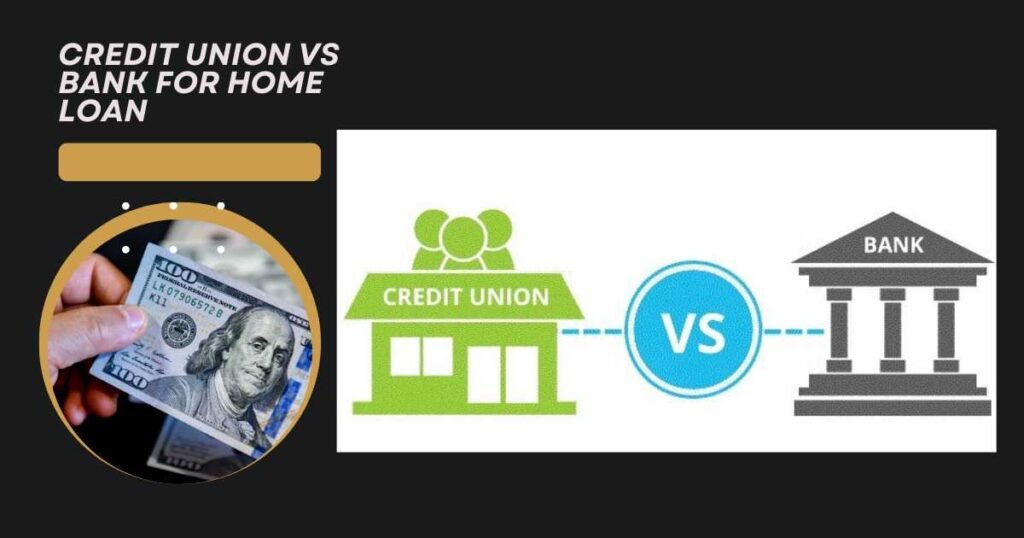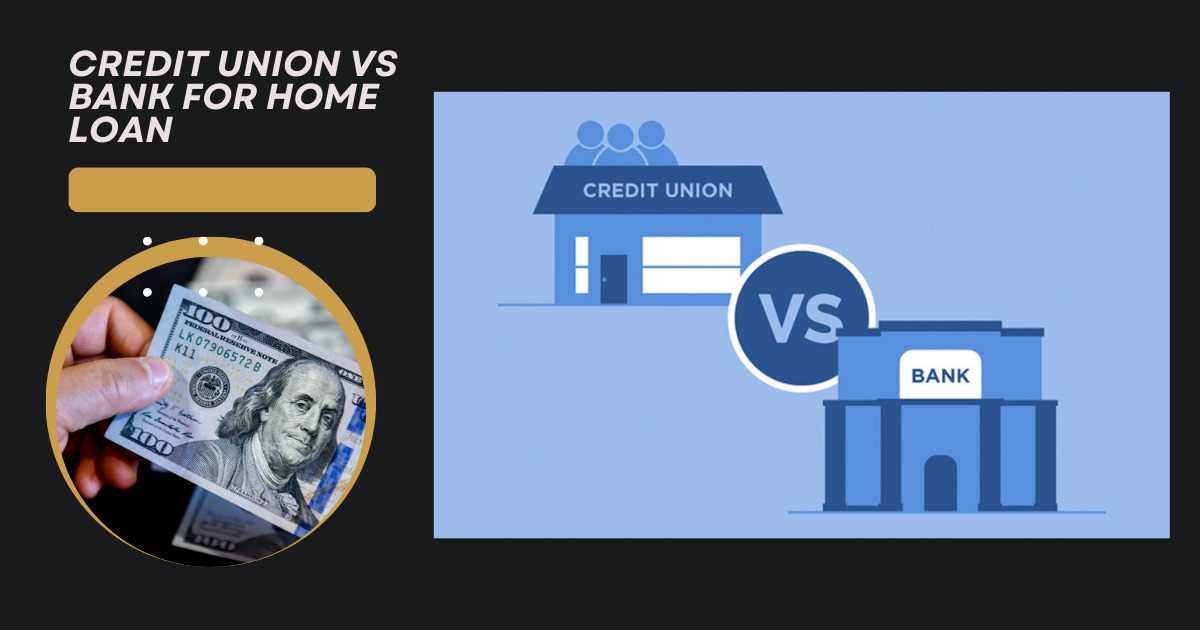A very important decision you face when buying a home is which financing institution to choose for your future mortgage. While conventional banks have always been the first preference for many homebuyers, credit unions are now getting popular too. This comprehensive guide will examine both banks and credit unions as regards home loans. It will, therefore, aid you in making an informed choice that fits your financial objectives as well as your personal likes.
Understanding the Landscape: Credit Unions vs Banks
Prior to entering the matter of home loans, it is crucial to familiarize oneself with the essential distinctions between credit unions and banks:
Ownership Structure
Credit unions are non-profit organizations here the members are the owners whereas banks are for-profit, meaning that the shareholders are the owners of the organization. This distinction is important as it essentially differentiates these entities and indicates what sort of services they provide.
Profit Motivation
Banks tend to seeking profits for their shareholders, therefore, they often alter their fee structure and interest rates. Contrary to that, credit unions are mainly committed to their members and very often disburse the savings back to them through lower fees and higher rates.
Membership Requirements
Unlike banks that are places of access to anyone, credit unions normally require membership which is based on various criteria such as residence location, profession, or affiliation with certain organizations.
Get Loans Without a Bank Account

Comparing Mortgage Options: Credit Unions vs Banks
On the home loans, credit unions just like the banks have many products to offer. However, there are several key factors to consider:
Interest Rates
The most crucial element about obtaining a mortgage is the interest rate on the mortgage. According to recent data from the National Credit Union Administration (NCUA), credit unions often offer lower interest rates on mortgages compared to banks:
- 30-year fixed-rate mortgage: Credit unions 6.90% vs. Bank 7.02%
- 15-year fixed-rate mortgage: Credit unions at 6.50 % and banks at 6.65 %.
- 5/1 Year adjustable-rate mortgage: Credit Unions 6.41 percent vs Banks 6.87 percent
While some of the changes may not appear significant, accumulated over the term of a mortgage, such savings may be quite considerable.
Fees and Closing Costs
Credit unions often provide relatively lower fees and charges compared to when customers apply for a mortgage, the commission they provide and the closing cost. For instance, April Gleason, vice president of lending for University Credit Union said their credit union levies $699 for home loans, while banks have been known to charge as much as $1,500 or more in origination fees and other processing fees.
Approval Process
Typically, credit unions’ approval is much easier than that of most banks offering similar services. Home mortgage approvals by credit unions in 2022, stood at 61.23%5. It is because they would wish to deal with borrowers with a low credit rating or are willing to put down minimal collateral.
Loan Retention
Different from many banks, many credit unions retain the mortgages they make rather than selling them in the secondary markets. That can result in better customer treatment throughout the time of your loan.
Advantages of Credit Union Mortgages
Choosing a credit union for your home loan comes with several potential benefits:
1. Competitive Interest Rates
Non-profit CU have the ability to offer lower interest rates on mortgages than traditional ones because of its main focus on its members.
2. Lower Fees
Non-profit in nature, credit unions demand less fees for any mortgage related services such as processing fees and origination fees.
3. Personalized Service
credit union providers enjoy greater customer relations because as cooperatives, they are able to offer client-specific advice in cases of mortgage products.
4. Flexible Lending Criteria
Credit unions could be more employers when it comes to reception of subprime credit scores of the borrowers as well as other exceptional situations.
5. Member Benefits
Many have certain programs or some unique promotions for first-time homebuyers or loyal customers of the credit union.

Advantages of Bank Mortgages
While credit unions offer many benefits, banks have their own set of advantages:
1. Wider Range of Products
Banks are likely to offer a wider range of mortgage options that are independent or in combination with jumbo or government-sponsored choices in the market.
2. Advanced Technology
Larger banks generally spend more on technology and give you modern and accessible web and/or mobile banking tools to help you deal with your mortgage.
3. Extensive Branch Networks
Banks also tend to have more branches and ATMs all over the country than credit unions so if face to face service is needed, that is easier.
4. No Membership Requirements
Compared to credit unions, banks are available for everyone, so no eligibility to become a member of this institution is required.
Making Your Decision: Factors to Consider
When choosing between a credit union and a bank for your home loan, consider the following factors:
1. Interest Rates and Fees
Look at the interest rates and fees charged by both types of institutions. Every little saving counts when it comes to mortgage and could translate to thousands by the time you complete paying for the house.
2. Loan Options
Assess the kind of mortgages that are provided and confirm that the lender provides products that fit your needs as whether it is a conventional loan, FHA or any other programs.
3. Customer Service
Think how much specific attention and individual approach are important to you. Sometime credit unions perform well in this area but there are some banks that value customers’ portfolios most.
4. Technology and Convenience
Evaluate the role of other complex services of online and mobile banking to control your mortgage.
5. Membership Eligibility
Although credit unions offer a flexible source of credit, you should know if you qualify for credit union membership.
6. Long-term Relationship
Here, consider if you would wish to use other services of the institution apart from mortgaging your house.

Expert Opinions and Industry Trends
Industry experts and recent studies provide valuable insights into the credit union vs bank mortgage debate:
Chuck Price NEFCU, a credit union in Westbury, New York, the vice president of lending illustrates that credit unions are quicker to approve loans in cases when customers have a high DTI, a short work experience, or income sources difficult to prove — what would not let a MFB approve a loan.
That is in comparison to the average yearly interest rate of 4.54% and following the Credit Union National Association Membership Benefits Report for the First Quarter of 2024, credit union members in the United States saved $132 on a 30-year fixed rate mortgage of $300,00 compared to the rates offered by the bank.
Credit union mortgages are on the rise as a tendency. For home mortgage loans alone, credit unions provided funding for 1. 3 million in 2022, more so showing that their trends are on the rise.
Conclusion: Making the Right Choice for Your Home Loan
This home loan decision of selecting a credit union or a bank is entirely a user’s decision based on the user’s current status, requirements and preferences. Conventional wisdom demands that credit unions excel in certain sub sectors such as competitive rates, lower fees, and personal touch, which are factors that many homebuyers consider. However, the banking channels may possess a few more strengths with reference to product range, technological skills, and geographic coverage.
